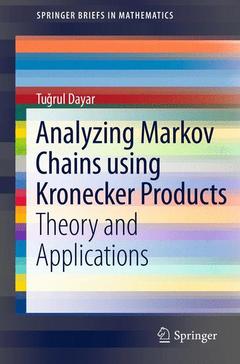Description
Analyzing Markov Chains using Kronecker Products, 2013
Theory and Applications
SpringerBriefs in Mathematics Series
Author: Dayar Tugrul
Language: English
Subject for Analyzing Markov Chains using Kronecker Products:
Approximative price 52.74 €
In Print (Delivery period: 15 days).
Add to cart86 p. · 15.5x23.5 cm · Paperback
Description
/li>Contents
/li>Comment
/li>
First to provide a solely Kronecker product based treatment of Markov chain analysis
The subject matter is interdisciplinary and at the intersection of applied mathematics, specifically numerical linear algebra and computational probability, and computer science
The exposition is concise and rigorous, yet it tries to be complete and touches almost all relevant aspects without being too technical.
Includes supplementary material: sn.pub/extras
Includes supplementary material: sn.pub/extras




